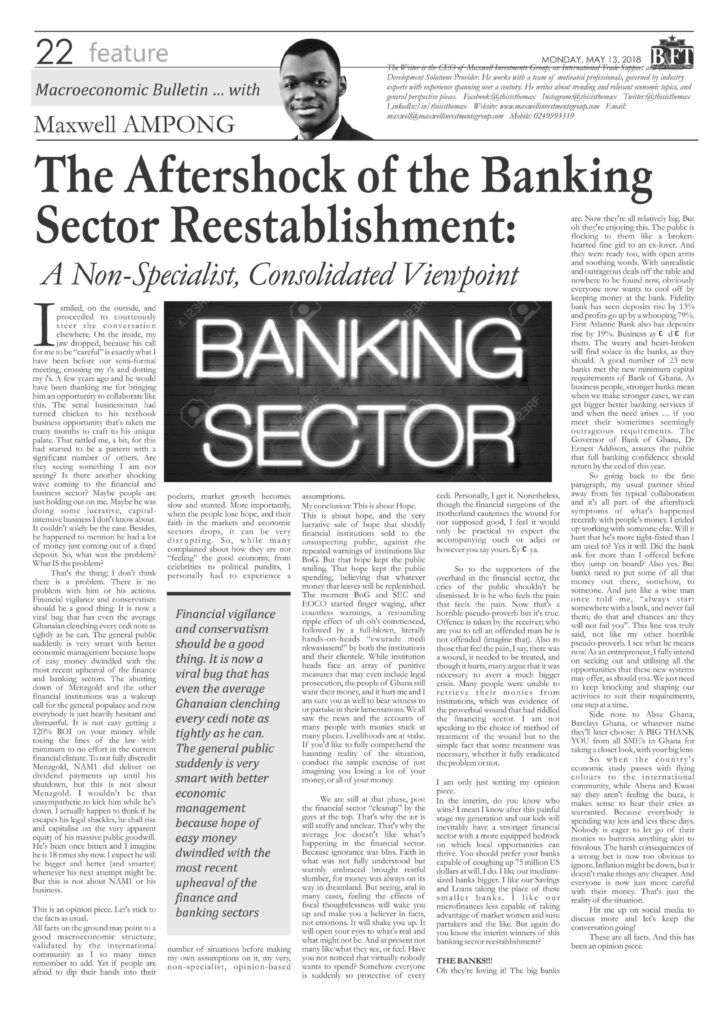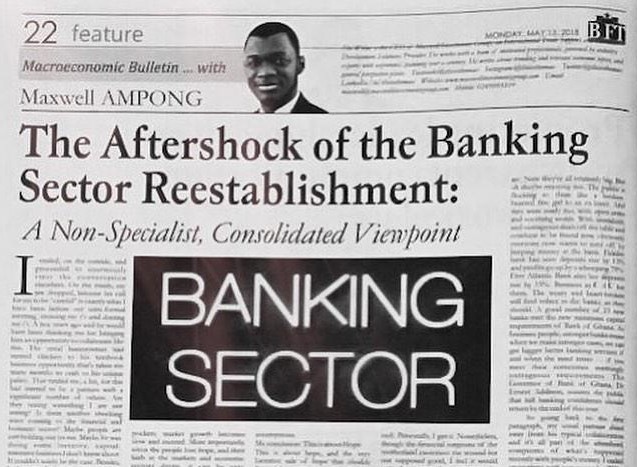
I smiled, on the outside, and proceeded to courteously steer the conversation elsewhere. On the inside, my jaw dropped, because his call for me to be “careful” is exactly what I have been before our semi-formal meeting, crossing my t’s and dotting my i’s. A few years ago, and he would have been thanking me for bringing him an opportunity to collaborate like this. The serial businessman had turned chicken to his textbook business opportunity that’s taken me many months to craft to his unique palate. That rattled me, a bit, for this had started to be a pattern with a significant number of others. Are they seeing something I am not seeing? Is there another shocking wave coming to the financial and business sector? Maybe people are just holding out on me. Maybe he was doing some lucrative, capital-intensive business I don’t know about. It couldn’t solely be the case. Besides, he happened to mention he had a lot of money just coming out of a fixed deposit. So, what was the problem? What IS the problem?
That’s the thing; I don’t think there is a problem. There is no problem with him or his actions. Financial vigilance and conservatism should be a good thing. It is now a viral bug that has even the average Ghanaian clenching every cedi note as tightly as he can. The general public suddenly is very smart with better economic management because hope of easy money dwindled with the most recent upheaval of the finance and banking sectors. The shutting down of Menzgold and the other financial institutions was a wakeup call for the general populace and now everybody is just heavily hesitant and distrustful. It is not easy getting a 120% ROI on your money while toeing the lines of the law with minimum to no effort in the current financial climate. To not fully discredit Menzgold, NAM1 did deliver on dividend payments up until his shutdown, but this is not about Menzgold. I wouldn’t be that unsympathetic to kick him while he’s down. I actually happen to think if he escapes his legal shackles, he shall rise and capitalise on the very apparent equity of his massive public goodwill. He’s been once bitten, and I imagine he is 18 times shy now. I expect he will be bigger and better (and smarter) whenever his next attempt might be. But this is not about NAM1 or his business.
This is an opinion piece. Let’s stick to the facts as usual.
All facts on the ground may point to a good macroeconomic structure, validated by the international community as I so many times remember to add. Yet if people are afraid to dip their hands into their pockets, market growth becomes slow and stunted. More importantly, when the people lose hope, and their faith in the markets and economic sectors drops, it can be very disrupting. So, while many complained about how they are not “feeling” the good economy, from celebrities to political pundits, I personally had to experience a number of situations before making my own assumptions on it, my very, non-specialist, opinion-based assumptions.
My conclusion: This is about Hope.
This is about hope, and the very lucrative sale of hope that shoddy financial institutions sold to the unsuspecting public, against the repeated warnings of institutions like BoG. But that hope kept the public smiling. That hope kept the public spending, believing that whatever money that leaves will be replenished. The moment BoG and SEC and EOCO started finger waging, after countless warnings, a resounding ripple effect of uh-oh’s commenced, followed by a full-blown, literally hands-on-heads “ewurade medi nkwasiasem!” by both the institutions and their clientele. While institution heads face an array of punitive measures that may even include legal prosecution, the people of Ghana still want their money, and it hurt me, and I am sure you as well to bear witness to or partake in their lamentations. We all saw the news and the accounts of many people with monies stuck at many places. Livelihoods are at stake. If you’d like to fully comprehend the haunting reality of the situation, conduct the simple exercise of just imagining you losing a lot of your money, or all of your money.
We are still at that phase, post the financial sector “cleanup” by the guys at the top. That’s why the air is still stuffy and unclear. That’s why the average Joe doesn’t like what’s happening in the financial sector. Because ignorance was bliss. Faith in what was not fully understood but warmly embraced brought restful slumber, for money was always on its way in dreamland. But seeing, and in many cases, feeling the effects of fiscal thoughtlessness will wake you up and make you a believer in facts, not emotions. It will shake you up. It will open your eyes to what’s real and what might not be. And at present not many like what they see or feel. Have you not noticed that virtually nobody wants to spend? Somehow everyone is suddenly so protective of every cedi. Personally, I get it. Nonetheless, though the financial surgeons of the motherland cauterise the wound for our supposed good, I feel it would only be practical to expect the accompanying ouch or adjei or however you say yours. Ɛyɛ ya.
So, to the supporters of the overhaul in the financial sector, the cries of the public shouldn’t be dismissed. It is he who feels the pain that feels the pain. Now that’s a horrible pseudo-proverb but it’s true. Offence is taken by the receiver; who are you to tell an offended man he is not offended (imagine that). Also, to those that feel the pain, I say, there was a wound, it needed to be treated, and though it hurts, many argue that it was necessary to avert a much bigger crisis. Many people were unable to retrieve their monies from institutions, which was evidence of the proverbial wound that had riddled the financing sector. I am not speaking to the choice of method of treatment of the wound but to the simple fact that some treatment was necessary, whether it fully eradicated the problem or not.
I am only just writing my opinion piece.
In the interim, do you know who wins? I mean I know after this painful stage my generation and our kids will inevitably have a stronger financial sector with a more equipped bedrock on which local opportunities can thrive. You should prefer your banks capable of coughing up 75 million US dollars at will. I do. I like our medium-sized banks bigger. I like our Savings and Loans taking the place of these smaller banks. I like our microfinances less capable of taking advantage of market women and susu partakers and the like. But again, do you know the interim winners of this banking sector reestablishment?
THE BANKS!!!
Oh, they’re loving it! The big banks are. Now they’re all relatively big. But oh, they’re enjoying this. The public is flocking to them like a broken-hearted fine girl to an ex-lover. And they were ready too, with open arms and soothing words. With unrealistic and outrageous deals off the table and nowhere to be found now, obviously everyone now wants to cool off by keeping money at the bank. Fidelity bank has seen deposits rise by 13% and profits go up by a whooping 79%. First Atlantic Bank also has deposits rise by 19%. Business ayɛ dɛ for them. The weary and heart-broken will find solace in the banks, as they should. A good number of 23 new banks met the new minimum capital requirements of Bank of Ghana. As businesspeople, stronger banks mean when we make stronger cases, we can get bigger better banking services if and when the need arises … if you meet their sometimes seemingly outrageous requirements. The Governor of Bank of Ghana, Dr Ernest Addison, assures the public that full banking confidence should return by the end of this year.
So, going back to the first paragraph, my usual partner shied away from his typical collaboration and it’s all part of the aftershock symptoms of what’s happened recently with people’s money. I ended up working with someone else. Will it hurt that he’s more tight-fisted than I am used to? Yes, it will. Did the bank ask for more than I offered before they jump on board? Also, yes. But banks need to put some of all that money out there, somehow, to someone. And just like a wise man once told me, “always start somewhere with a bank, and never fail them; do that and chances are they will not fail you”. This line was truly said, not like my other horrible pseudo-proverb. I see what he means now. As an entrepreneur, I fully intend on seeking out and utilising all the opportunities that these new systems may offer, as should you. We just need to keep knocking and shaping our activities to suit their requirements, one step at a time.
Side note to Absa Ghana, Barclays Ghana, or whatever name they’ll later choose: A BIG THANK YOU from all SME’s in Ghana for taking a closer look, with your big lens.
So, when the country’s economic study passes with flying colours to the international community, while Abena and Kwasi say they aren’t feeling the buzz, it makes sense to hear their cries as warranted. Because everybody is spending way less and less these days. Nobody is eager to let go of their monies to buttress anything akin to frivolous. The harsh consequences of a wrong bet are now too obvious to ignore. Inflation might be down, but it doesn’t make things any cheaper. And everyone is now just more careful with their money. That’s just the reality of the situation.
I hope you found this article insightful and enjoyable. Subscribe to the ‘Entrepreneur In You’ newsletter here: https://lnkd.in/d-hgCVPy.
I wish you a highly productive and successful week ahead!
♕ —- ♕ —- ♕ —- ♕ —- ♕
Disclaimer: The views, thoughts, and opinions expressed in this article are solely those of the author, Dr. Maxwell Ampong, and do not necessarily reflect the official policy, position, or beliefs of Maxwell Investments Group or any of its affiliates. Any references to policy or regulation reflect the author’s interpretation and are not intended to represent the formal stance of Maxwell Investments Group. This content is provided for informational purposes only and does not constitute legal, financial, or investment advice. Readers should seek independent advice before making any decisions based on this material. Maxwell Investments Group assumes no responsibility or liability for any errors or omissions in the content or for any actions taken based on the information provided.


